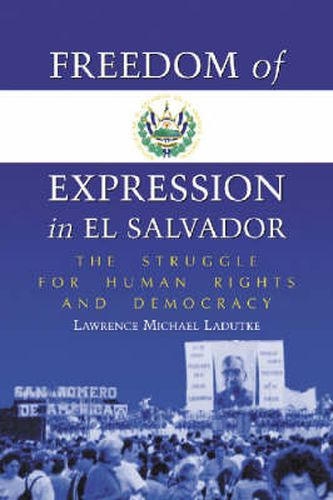Readings Newsletter
Become a Readings Member to make your shopping experience even easier.
Sign in or sign up for free!
You’re not far away from qualifying for FREE standard shipping within Australia
You’ve qualified for FREE standard shipping within Australia
The cart is loading…






This title is printed to order. This book may have been self-published. If so, we cannot guarantee the quality of the content. In the main most books will have gone through the editing process however some may not. We therefore suggest that you be aware of this before ordering this book. If in doubt check either the author or publisher’s details as we are unable to accept any returns unless they are faulty. Please contact us if you have any questions.
Both academics and diplomats frequently cite postwar El Salvador as an example of successful conflict resolution and democratization. Salvadoran human rights advocates, however, have had to continually and publicly express their support of key provisions in the 1992 peace accords. This freedom of expression contributed to the punishment of those responsible for the murder of opposition leader Francisco Velis and medical student Adriano Vilanova. Human rights advocates have been less successful in other areas, however, including their opposition to amnesty laws for wartime human rights violators and their work against vigilante death squads. This study covers the 1992 peace accords, which include the removal of human rights abusers from the military, the creation of a truth commission and the demilitarization of public security. It also discusses the troubling indications that the government is once again reducing the space available for freedom of expression, including the undermining of the Office of the Human Rights Counsel, the hostile attitude of President Francisco Flores, evidence of internal espionage and a changing international context. Later chapters focus on police reform. The book concludes by presenting some suggestions for increasing freedom of expression in transitional societies such as El Salvador. There is much evidence that shows freedom of expression is likely to be a better protected right when citizens and civil society institutions routinely exercise that right.
$9.00 standard shipping within Australia
FREE standard shipping within Australia for orders over $100.00
Express & International shipping calculated at checkout
This title is printed to order. This book may have been self-published. If so, we cannot guarantee the quality of the content. In the main most books will have gone through the editing process however some may not. We therefore suggest that you be aware of this before ordering this book. If in doubt check either the author or publisher’s details as we are unable to accept any returns unless they are faulty. Please contact us if you have any questions.
Both academics and diplomats frequently cite postwar El Salvador as an example of successful conflict resolution and democratization. Salvadoran human rights advocates, however, have had to continually and publicly express their support of key provisions in the 1992 peace accords. This freedom of expression contributed to the punishment of those responsible for the murder of opposition leader Francisco Velis and medical student Adriano Vilanova. Human rights advocates have been less successful in other areas, however, including their opposition to amnesty laws for wartime human rights violators and their work against vigilante death squads. This study covers the 1992 peace accords, which include the removal of human rights abusers from the military, the creation of a truth commission and the demilitarization of public security. It also discusses the troubling indications that the government is once again reducing the space available for freedom of expression, including the undermining of the Office of the Human Rights Counsel, the hostile attitude of President Francisco Flores, evidence of internal espionage and a changing international context. Later chapters focus on police reform. The book concludes by presenting some suggestions for increasing freedom of expression in transitional societies such as El Salvador. There is much evidence that shows freedom of expression is likely to be a better protected right when citizens and civil society institutions routinely exercise that right.